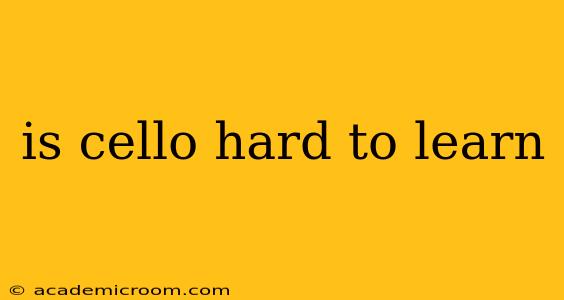The cello, with its rich, resonant tone, is a captivating instrument. But the question on many aspiring musicians' minds is: is cello hard to learn? The short answer is: yes, it's challenging, but also incredibly rewarding. The difficulty lies not just in mastering the physical techniques, but also in developing musicality and understanding. This guide will delve into the various aspects that contribute to the learning curve, helping you decide if the cello is the right instrument for you.
What Makes the Cello Difficult to Learn?
Several factors contribute to the cello's reputation as a challenging instrument to master. Let's break them down:
1. Physical Demands: Size and Posture
The cello's size is a significant factor. Unlike smaller string instruments like the violin or viola, the cello requires proper posture and physical strength to hold and play effectively. Maintaining good posture for extended periods can be tiring, especially for beginners. Learning to hold the bow correctly and develop proper bowing technique also takes time and practice.
2. Bowing Technique: Nuance and Control
Achieving a smooth, controlled bow stroke is crucial for producing beautiful cello tones. Mastering various bowing techniques, such as détaché, legato, and staccato, requires considerable practice and precision. Even slight variations in bow speed, pressure, and placement can dramatically affect the sound.
3. Left-Hand Technique: Finger Placement and Intonation
Accurate finger placement is essential for playing in tune. The cello's fingerboard is wider than that of the violin or viola, making precise finger placement more challenging. Developing good intonation requires a keen ear and consistent practice.
4. Musicality and Interpretation: Beyond the Notes
Learning to read music is only half the battle. Truly mastering the cello involves developing musicality and understanding how to interpret the music expressively. This includes understanding dynamics, phrasing, and articulation, adding emotional depth to your playing.
How Long Does It Take to Learn Cello?
There's no single answer to this question, as progress varies greatly depending on factors like:
- Natural aptitude: Some individuals naturally possess a better sense of rhythm, pitch, and coordination.
- Practice time: Consistent, dedicated practice is crucial for progress. Even short, focused practice sessions are more effective than infrequent, long ones.
- Teaching quality: A good teacher can significantly accelerate learning by providing personalized instruction and feedback.
- Learning goals: If your goal is to play simple melodies, you might achieve that relatively quickly. However, mastering advanced techniques and repertoire takes years of dedicated study.
Is It Harder Than Other Instruments?
Compared to instruments like the piano or recorder, the cello presents a steeper learning curve due to the physical demands and technical complexities mentioned earlier. However, the difficulty is relative. Some individuals may find the cello easier than other instruments, while others may struggle more. Ultimately, the "hardness" depends on individual aptitude, dedication, and learning style.
Can Adults Learn to Play the Cello?
Absolutely! While children often have an advantage in terms of flexibility and faster learning, adults can successfully learn the cello at any age. Adult learners may need to focus on developing proper posture and physical technique, but their maturity and focus can be significant assets in their learning journey.
What Are Some Common Challenges Cello Beginners Face?
- Posture: Maintaining proper posture can be physically demanding, especially in the beginning.
- Intonation: Playing in tune consistently takes time and practice.
- Bowing technique: Achieving a smooth, controlled bow stroke requires precision and coordination.
- Finger placement: Accurate finger placement is essential for clear and precise notes.
- Motivation: Maintaining consistent practice can be challenging, especially when progress feels slow.
Conclusion: Is the Cello Right for You?
Learning the cello is a challenging but deeply rewarding journey. If you're passionate about music and are willing to dedicate time and effort to practice, the rewards of playing this beautiful instrument will far outweigh the challenges. Consider taking a few introductory lessons to see if it's the right instrument for you. The joy of creating music with the cello is a unique and profoundly fulfilling experience.
